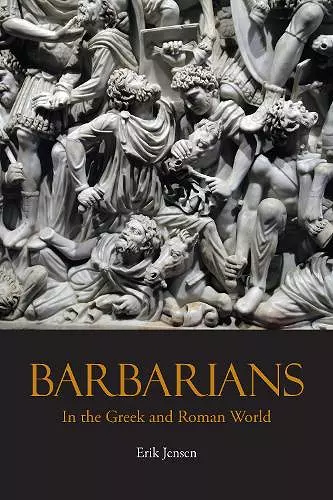Barbarians in the Greek and Roman World
Format:Paperback
Publisher:Hackett Publishing Co, Inc
Published:15th Sep '18
Should be back in stock very soon
This paperback is available in another edition too:
- Hardback£48.99(9781624667138)

What did the ancient Greeks and Romans think of the peoples they referred to as barbari? Did they share the modern Western conception—popularized in modern fantasy literature and role-playing games—of "barbarians" as brutish, unwashed enemies of civilization? Or our related notion of "the noble savage?" Was the category fixed or fluid? How did it contrast with the Greeks and Romans' conception of their own cultural identity? Was it based on race?
In accessible, jargon-free prose, Erik Jensen addresses these and other questions through a copiously illustrated introduction to the varied and evolving ways in which the ancient Greeks and Romans engaged with, and thought about, foreign peoples—and to the recent historical and archaeological scholarship that has overturned received understandings of the relationship of Classical civilization to its "others."
"A fascinating study of interrelatedness among peoples that does much to undermine the conventional notion of there being an essentialist divide between Greco-Roman and barbarian culture and peoples. Jensen's work is not only a testimony to the truly multicultural dimension of the ancient Mediterranean, but also a reminder of how cotemporary prejudices help shape our view of past societies. The world that the author paints is 'a tumult of different ideas, interpretations, and conflicts that had no final resolution.' What better reason could a historian offer for studying antiquity? Both readable and scholarly, Barbarians in the Greek and Roman World has a refreshingly modern ring and delivers an important modern message."
—Robert Garland, Colgate University
"This book is excellent, and even necessary, reading for any survey of the ancient world. Easy to read and unafraid to explain scholarly arguments, Jensen takes his readers on a tour of the so-called Greek and Roman world. While he follows traditional chronological and temporal boundaries, he does not adhere to the old scholarly lens. In fact, by directly challenging it, he opens our eyes to an entirely different ancient world. Rather than speak from the heart of the Roman forum or the Athenian agora, Jensen approaches ancient history from the position of an outsider, as a scholar unwilling to settle on simple narratives of progress from single centers, but rather forcefully admitting difference. Ultimately, Jensen illustrates the benefit of moving beyond the Greeks and the Romans and the importance of doing so. After all, as far as the Romans and Greeks were concerned, we—the English-speaking readers that form Jensen's audience—are as much, if not more, barbarian than Greco-Roman!"
—Brian Turner, Portland State University
“Encounters with so-called 'Barbarians' are one of the central themes of Greek and Roman history. In this well written and thoroughly researched book Erik Jensen provides students for the first time with an up-to-date account of the role of 'Barbarians' from the beginning of Greek history in the second millennium BCE to the fall of the Roman Empire almost three millennia later.”
—Stanley Burstein, California State University, Los Angeles
"An important book and a significant addition to the field. Written with verve and a bit of warm humor, it is also eminently readable. Moreover, Jensen’s clear exposition of the possible pitfalls awaiting unwary students as they try to make sense out of the available textual, artistic, and archaeological evidence marks him as a first-rate scholar and teacher."
—Alfred J. Andrea, Emeritus Professor of History, University of Vermont
"In their interactions with foreigners, ancient Greeks and Romans developed a rhetoric of 'the barbarian' whose legacy still shapes racial and ethnic stereotypes today. Yet as Jensen shows in this splendid study, the attitudes of Greeks and Romans to outsiders (including each other) could also be remarkably nuanced. Written in clear and accessible prose, Jensen's exploration of the cultural and social interconnectedness of the greater Mediterranean world from the Bronze Age to the collapse of Roman hegemony will reward the close attention of students, teachers, and indeed anyone interested in the classical past."
—Jonathan Conant, Brown University
"Erick Jensen offers a lucid and sweeping account of the ways in which Greeks and Romans conceived of and engaged with everyone else in the ancient world—that is, with barbarians. In addition to engaging with scholarly arguments and offering copious notes behind his approachable prose, Jensen includes an excellent chapter that grapples with the challenging topic of passing the mantle of civilization from Greece to Rome. This chapter embraces the difficulty using it as an opportunity to reveal the fissures in the artificial construct that is discourse about civilization."
—Joshua P. Nudell, University of Missouri
"This book aims to introduce the many cultures the Greeks and Romans encountered and the ways that both Greeks and Romans interacted with, and perceived, these different cultures. It is explicitly addressed to readers 'without many years of study behind them.' The author was thoroughly successful in this endeavor: he manages to give an overview on the subject from early Greece until Late Antiquity in a very readable and engaging manner. Jensen gives a fascinating picture of the multicultural world of the ancient Mediterranean and shows in every chapter that the Greeks and Romans and the ‘barbarians’ they encountered often had much in common. Especially to be appreciated is that every chapter contains a summary of the modern scholarship about the subject. The last chapter gives a general, very impressive overview of how far the perception of foreign cultures was shaped by ancient stereotypes and until very recently often described with phrases taken from ancient authors. In turn, modern (ideological or political) contexts often influenced the view of ancient societies. This book is not just about ancient cultures or ethnicities; by showing how stereotypes were forged and used already in antiquity, it is very relevant for present times, too."
—Balbina Bäbler, University of Goettingen, in the Bryn Mawr Classical Review
ISBN: 9781624667121
Dimensions: 228mm x 152mm x 152mm
Weight: unknown
312 pages